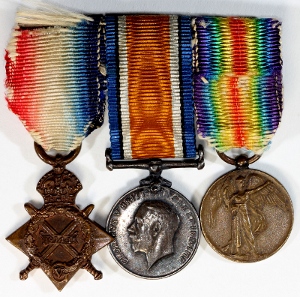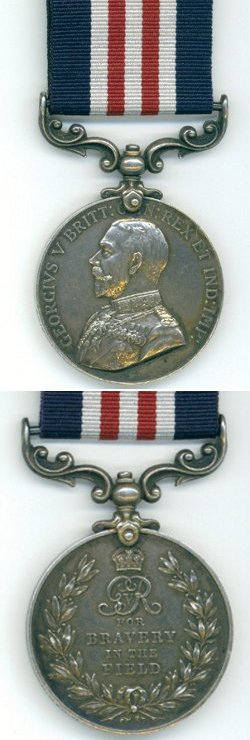Topic: Medals

Medal Sales; it's easy to be critical
I was reading a post on facebook not long ago where someone on a soldiers' memorial site posted a link to an auction for the medals and Memorial Cross to a Canadian airman who died during the Second World War. As often happens, this was followed by a post stating that they "should NOT be for sale. Whoever currently owns these should do everything possible to locate a family member of the deceased and return the medals free of charge," and another that this sale was "Inconceivable …", and that it was "disgusting making money off of them."
In balance, other posters held more moderate views. These posted comments such as "if they are for sale then someone in the family did not want them. It may be better to have them in the hands of a collector who will treasure them more. Later they may end up back with the family or in a museum."
 It's easy to be critical of someone else's actions. Offering criticism, either directly or by "innocently" suggesting what "should" be done, costs nothing. One doesn't have to open their wallet to offer criticism. One doesn't have to do anything to offer criticism. Yet by offering such remarks, they portray themselves as speaking from a position of moral superiority, their beliefs being reinforced by comments of agreement from others.
It's easy to be critical of someone else's actions. Offering criticism, either directly or by "innocently" suggesting what "should" be done, costs nothing. One doesn't have to open their wallet to offer criticism. One doesn't have to do anything to offer criticism. Yet by offering such remarks, they portray themselves as speaking from a position of moral superiority, their beliefs being reinforced by comments of agreement from others.
For those who would be critical and feel they need to declare what the seller should be doing instead, I would (and did) offer the following advice:
"If anyone thinks that efforts should be made to find the families connected to medals that are for sale, and believe that the price involved should be sacrificed by the current owner, then feel free to buy them with your own money and conduct that search for the family. Just remember that these medals, in nearly every case, were sold by family members in the first place (and not all to buy bread during the Depression years), so do not be surprised if you later see them somewhere for sale again. Not all families and not all individuals share the same feelings for the historic and sentimental value of these medals as you might. A few would happily take them graciously with one hand and sell them the following week with the other. And if you find several competing "claims" for a free gift of medals from you, how will you choose which descendant, or distant relative in the case of no direct offspring, will you give them to?
In a not unfamiliar trend, comments on the post continued in the vein that the choice of a family member to sell medals was a foreign concept. At face value, this is a well supported sentiment by those who might frequent a Facebook page commemorating soldiers, but it also fails to acknowledge that other views are possible, and equally supportable by those who hold them.
 In commenting on this view, I added:
In commenting on this view, I added:
"It's not hard to imagine at all. Some people just don't feel the same way about parts (or any, for some) of their family history. Searches on ebay for "my father's medals" or "my grandfather's medal" will occasionally turn up auctions where the sellers are completely open about passing them along that way. It's also not hard to imagine someone having a father's or grandfather's medals, only to associate them with the pain he might have suffered from injuries seen or unseen. Those medals, for some, may be reminders, not of pride and honour but of pain and suffering, and they want to remove that reminder from their lives. Who are we to determine what justification someone needs to keep medals, or what reasons might be appropriate for medals to be sold by a family member. Many people talk about the freedoms soldiers have protected for us, one of those might be considered the freedom to choose what to do with personal property. Sentimental value, for that is what we are discussing, is a personal choice, not something to be directed, or expected of others.
It's easy to suggest that others should share one's own feelings about medals, or anything else one chooses. Social media sites, like facebook, provide a perfect platform where those of like mind continue to reinforce each others' opinions. But, as a popular book and television series states "words are wind," and leave as little impression once they are past. For those who would decry the sale of medals, and vilify the dealers and collectors, I would ask this:—
"Why aren't you buying them and donating them to museums, or returning them to families? It costs nothing to suggest they should be donated, but is that sentiment strong enough to be worth your money to put into action? Are you ready to put your money where your mouth is?"
I have yet to see any grass roots movement to acquire medals to donate them to museums. Perhaps it is because some of those who might do so realize that medals in museums are often lost to public view, the space and money to display them being unavailable. Perhaps some actually realize that collectors do more to preserve and promote the history behind these medals them many museums are able to do. And perhaps some realize that dealers and collectors are willing to back their commitment to preserving history with time, energy and their own hard-earned money.
It's easy to criticize the selling of medals when you offer nothing but words.
I, for one, will continue to collect medals, to research the soldiers that were awarded them, and to add to my regiment's understanding of their service.
For those who would spend their time criticizing my hobby, perhaps you need one of your own.

